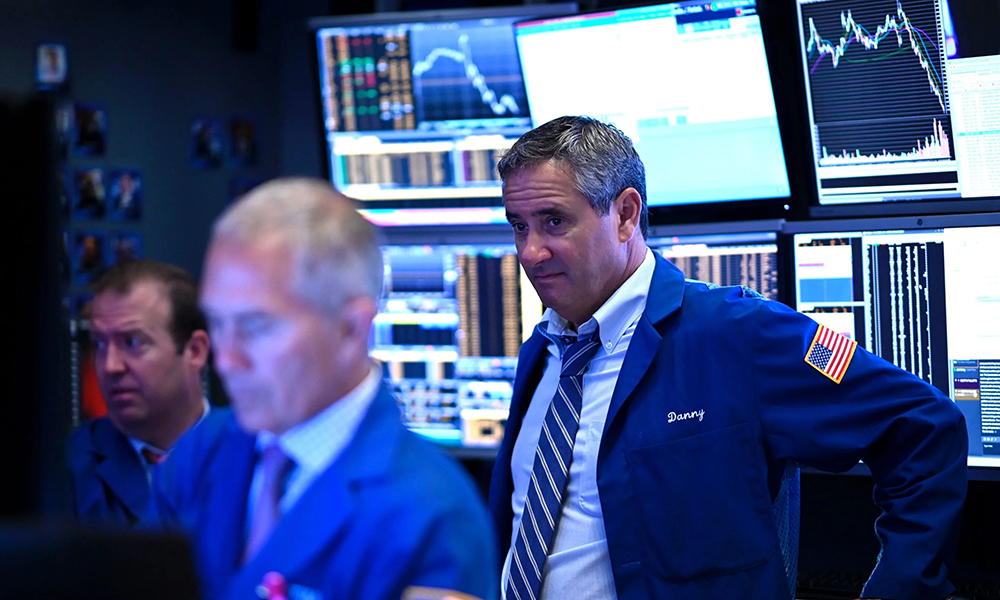
在过去一年时间里,在20世纪80年代以来从未见过的通货膨胀中,美国人苦苦挣扎着支付账单,不得不精打细算,呼吁涨薪。但对于企业来说,情况就完全不同了。
美国商务部(Commerce Department)周三公布的数据显示,企业利润屡创新高,非金融企业在第三季度创下了约2万亿美元的最新纪录。
虽然利润增长被大肆报道,并导致民主党高层指责高管们“哄抬物价”,但摩根士丹利的首席信息官和首席美国股票策略师迈克·威尔逊(Mike Wilson)说,投资者在很大程度上忽视了通胀给企业带来的好处——他们绝对忽视了当这种好处消失时会发生什么。
威尔逊最近获封《机构投资者》(Institutional Investor)首席股票策略师。他认为,随着通胀消退,将拉低企业利润和收益。
“通胀是推动利润上升的原因。因此,随着明年通胀率下降……这对股市很不利。”他周四对彭博社(Bloomberg)表示。“这将挤压利润……我们认为,这是很多投资者低估的地方。”
威尔逊说,他预计到2023年底,通胀率将降至2%-3%之间。
许多股市投资者一直希望通胀结束,因为这将使美联储(Federal Reserve)放缓、停止甚至逆转加息,而加息会拖累股价。
Fundstrat的汤姆·李(Tom Lee)甚至认为,随着通胀消退和美联储放松政策,标普500指数可能在今年年底前上涨12%,达到4,500点。
但威尔逊指出,事情也有另一面。他说,随着通胀下降,收益也会下降,这应该会在明年第一季度导致股市走低,他认为大多数同行“看跌程度不够”。
威尔逊说,在与客户的交谈中,他发现最近的股市反弹是历史上 “最遭人怨恨的熊市反弹”之一,因为他们认为这是个陷阱,他警告其他人不要陷入其中。
他补充说,股市短期内可能继续上涨,但他认为,到第一季度末,标普500指数可能跌至3000点至3300点之间,较当前水平低25%左右。
为了避免股价下跌遭受损失,他建议投资者在2023年前4个月之前投资现金和债券,避免投资股票。(财富中文网)
译者:中慧言-王芳
在过去一年时间里,在20世纪80年代以来从未见过的通货膨胀中,美国人苦苦挣扎着支付账单,不得不精打细算,呼吁涨薪。但对于企业来说,情况就完全不同了。
美国商务部(Commerce Department)周三公布的数据显示,企业利润屡创新高,非金融企业在第三季度创下了约2万亿美元的最新纪录。
虽然利润增长被大肆报道,并导致民主党高层指责高管们“哄抬物价”,但摩根士丹利的首席信息官和首席美国股票策略师迈克·威尔逊(Mike Wilson)说,投资者在很大程度上忽视了通胀给企业带来的好处——他们绝对忽视了当这种好处消失时会发生什么。
威尔逊最近获封《机构投资者》(Institutional Investor)首席股票策略师。他认为,随着通胀消退,将拉低企业利润和收益。
“通胀是推动利润上升的原因。因此,随着明年通胀率下降……这对股市很不利。”他周四对彭博社(Bloomberg)表示。“这将挤压利润……我们认为,这是很多投资者低估的地方。”
威尔逊说,他预计到2023年底,通胀率将降至2%-3%之间。
许多股市投资者一直希望通胀结束,因为这将使美联储(Federal Reserve)放缓、停止甚至逆转加息,而加息会拖累股价。
Fundstrat的汤姆·李(Tom Lee)甚至认为,随着通胀消退和美联储放松政策,标普500指数可能在今年年底前上涨12%,达到4,500点。
但威尔逊指出,事情也有另一面。他说,随着通胀下降,收益也会下降,这应该会在明年第一季度导致股市走低,他认为大多数同行“看跌程度不够”。
威尔逊说,在与客户的交谈中,他发现最近的股市反弹是历史上 “最遭人怨恨的熊市反弹”之一,因为他们认为这是个陷阱,他警告其他人不要陷入其中。
他补充说,股市短期内可能继续上涨,但他认为,到第一季度末,标普500指数可能跌至3000点至3300点之间,较当前水平低25%左右。
为了避免股价下跌遭受损失,他建议投资者在2023年前4个月之前投资现金和债券,避免投资股票。(财富中文网)
译者:中慧言-王芳
Over the past year, Americans have pinched pennies and called for higher wages as they struggle to pay their bills amid inflation not seen since the 1980s. But for corporations, it’s been a different story.
Corporate profits have routinely notched record highs, with the latest roughly $2 trillion high water mark being set by non-financial corporations in the third quarter, according to Commerce Department data released Wednesday.
While the profit boom has been thoroughly covered, and led top Democrats to accuse executives of “price gouging,” Morgan Stanley’s CIO and chief U.S. equity strategist Mike Wilson says that investors have largely ignored the benefits of inflation for corporations—and they’ve definitely ignored what will happen when that benefit goes away.
Wilson—who recently earned Institutional Investor’s top stock strategist title—argues that as inflation subsides, it will drag corporate margins and earnings lower.
“Inflation is what drove profits higher. So as inflation comes down next year…that’s bad for equities,” he told Bloomberg on Thursday. “It’s going to crush margins…and this is the part of the story that we think is underappreciated by a lot of investors.”
Wilson said that he is forecasting inflation to fall to between 2% to 3% by the end of 2023.
Many stock market investors have been hoping for the end of inflation, because it would allow the Federal Reserve to slow, stop, or even reverse its interest rate hikes, which are a drag on stock prices.
Fundstrat’s Tom Lee has even argued that the S&P 500 could experience a 12% rally to 4,500 before the end of the year, as inflation subsides and the Fed relaxes its policies.
But Wilson pointed out there is another side to the coin. As inflation falls, so will earnings, which should drag stocks lower in the first quarter of next year, he says, arguing most of his peers “aren’t bearish enough.”
Wilson said that in conversations with clients, he found that the recent rally in stocks is one of the “most hated bear market rallies” in history because they believe it’s a trap, and he warned others not to get caught in it.
He added that stocks may continue to rise in the near term, but argued that by the end of the first quarter, the S&P 500 could fall to between 3000 and 3300, or roughly 25% below current levels.
To avoid the drop, he recommended investors look to cash and bonds and avoid equities until after the first four months of 2023.






